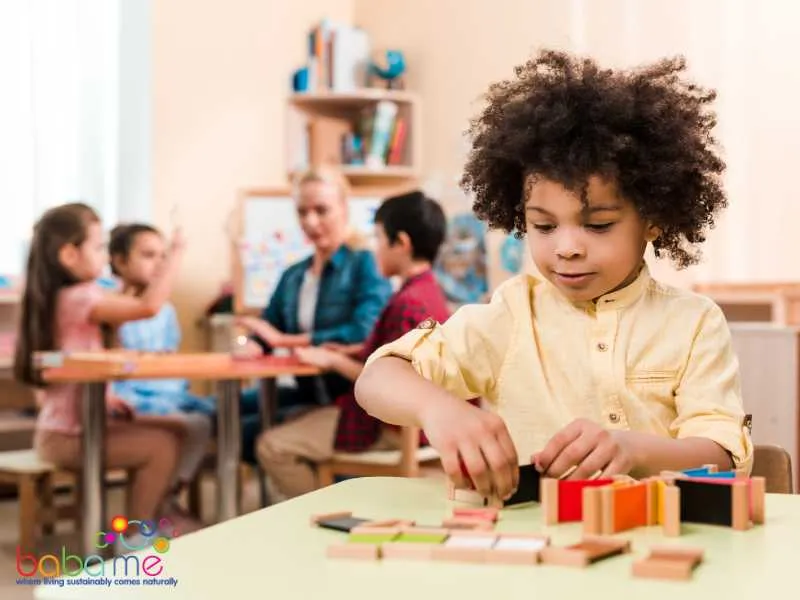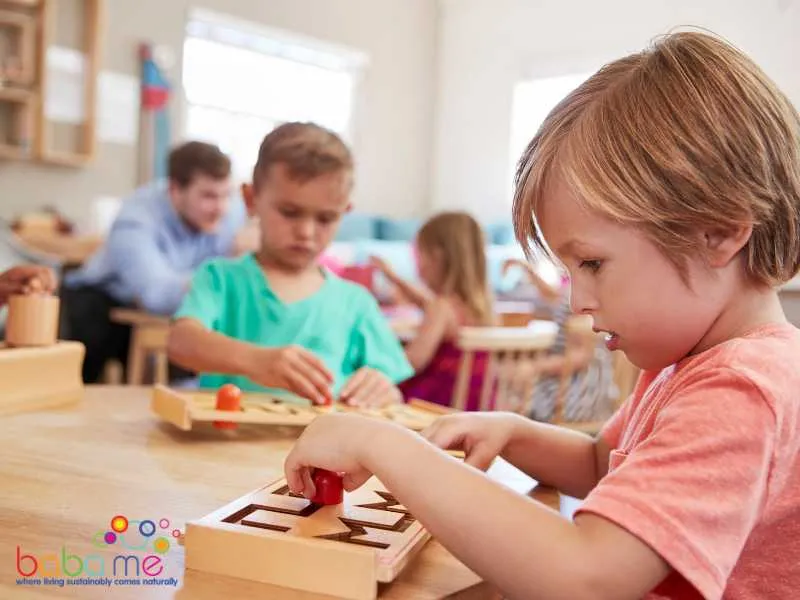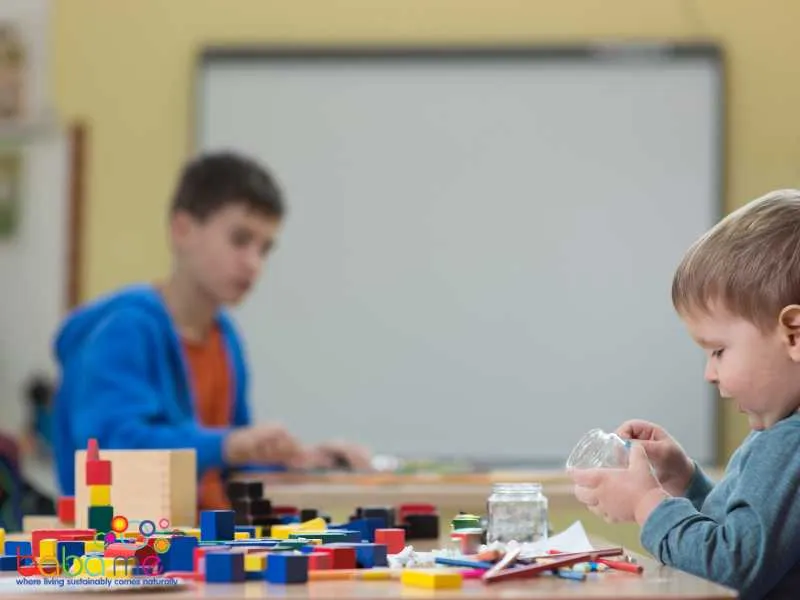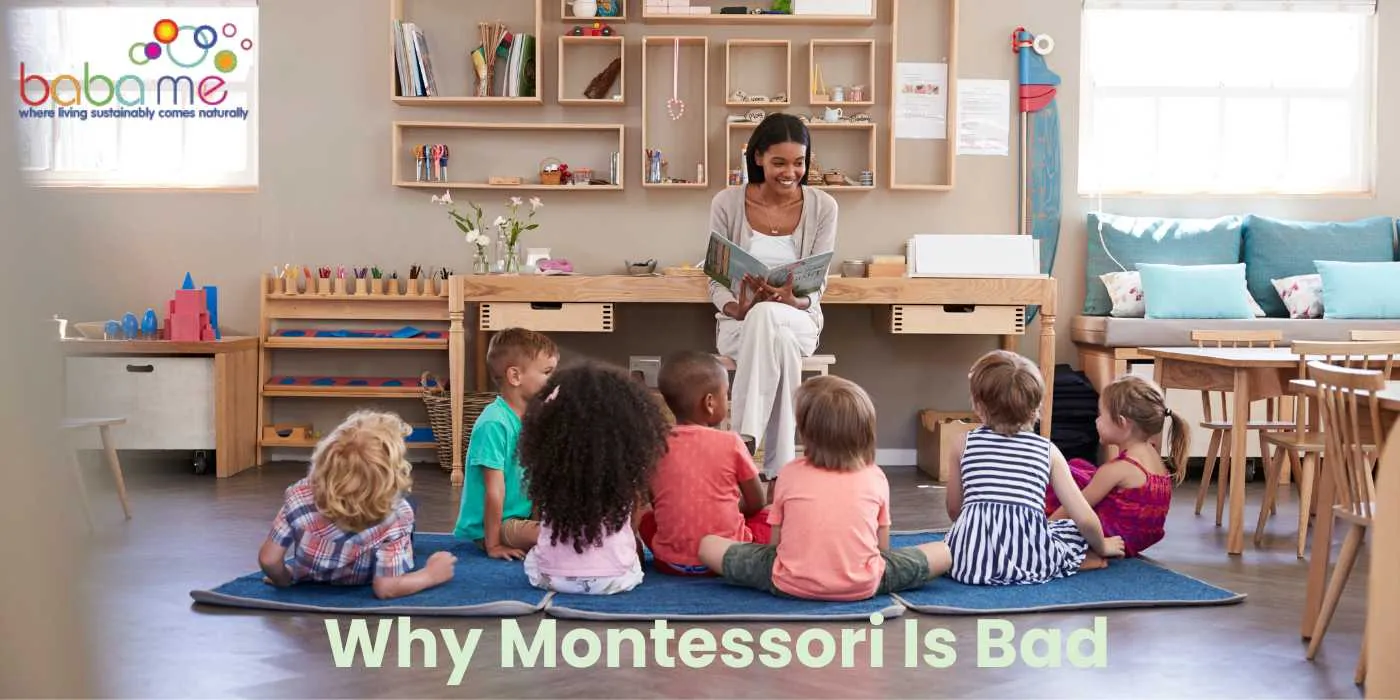Venturing into the debate on Why Montessori Is Bad can be both enlightening and contentious. While the Montessori method boasts many advocates who vouch for its effectiveness, some critics pinpoint potential drawbacks.
Detractors argue that Montessori might not offer a structured enough environment for some children, leading to potential gaps in learning. Others feel it may not adequately prepare students for the realities of traditional schooling systems or standardized testing. Concerns about costs, lack of clear assessment methods, and potential incompatibilities with children needing more guidance are also discussed. This article will critically examine these concerns and provide insights from various educational perspectives.
Interested in understanding the counterpoints to Montessori education? Dive in as we explore the criticisms, keeping an open mind to a holistic view of education.
The Montessori method is renowned worldwide for its holistic approach to education and child development. While it has countless proponents who vouch for its effectiveness, some misconceptions might lead people to believe it’s not suitable for every child. For instance, its emphasis on self-directed learning might be misunderstood as a lack of structure or guidance.
The Montessori environment’s reliance on tangible materials over traditional textbooks can be misconstrued as neglecting academic rigor. However, it’s essential to understand that these characteristics are purposefully designed to cater to individual learning paces and foster innate curiosity. When implemented correctly, the Montessori method can provide a well-rounded, enriching, and empowering education. It’s always vital for parents to research and determine the best fit for their child’s unique needs and temperament.
Key Takeaways: Criticisms of Montessori Education
- Lack of Structure in a Montessori School:
- Too Much Freedom: Critics argue that the Montessori method gives children too much freedom, potentially leading to a lack of discipline or direction.
- Inconsistent Routines: The absence of a strict schedule might not prepare students for more traditional educational environments or the structured nature of many workplaces.
- Limited Social Interaction:
- Age Group Mixing: While mixed-age classrooms can have benefits, critics argue they might limit interactions with same-age peers, affecting social development.
- Potential for Isolation: The emphasis on individual work might reduce opportunities for group activities and collaboration.
- Assessment Concerns:
- Lack of Traditional Testing: The Montessori method’s minimal use of standardized tests can make it challenging to assess a student’s progress compared to peers in traditional educational settings.
- Transitioning Difficulties: Students might face challenges when transitioning from a Montessori environment to a traditional school, especially if they’re unaccustomed to standard testing.
- Not Ideal for Every Child:
- Learning Styles: Montessori might not cater to all learning styles, especially for children who thrive in more structured environments.
- Special Needs Considerations: Some believe that the Montessori method might not be equipped to handle children with specific special needs or learning disabilities.
- Variability in Implementation:
- Not All Montessori Schools are Equal: The quality and adherence to Montessori principles can vary widely from one institution to another, leading to inconsistent experiences.
- Certification Issues: Not all teachers in Montessori schools may be Montessori-certified, impacting the quality of education.
- Cost Prohibitive:
- Expensive Tuition: Many Montessori schools, especially in certain regions, can be costly, limiting access for many families.
- Traditional Subjects Might Be Neglected:
- Emphasis on Practical Life Skills: Critics argue that focusing on practical life skills might come at the expense of traditional academic subjects, potentially affecting foundational knowledge in areas like math or science.
Why Montessori is Bad Quick Summary:
| Pros of Montessori Education | Cons of Montessori Education |
|---|---|
| Mixed-age classrooms | May not suit all learning styles |
| Encourages independence | Less emphasis on group work |
| Promotes lifelong learning | Might be challenging for students transitioning to traditional schools |
| Hands-on learning experiences | May lack in structured curriculum for subjects like Math and English |
| Mixed age classrooms | Can be more expensive than traditional education |
| Encourages creativity | Lack of standardized testing may make progress tracking difficult |
| Develops social and emotional skills | Less emphasis on competitive sports and extracurricular activities |
Montessori Lack of Structure:
The Montessori approach is celebrated for its unique, child-centered methodology that offers an environment promoting exploration and independent learning. A common misconception about Montessori is the perceived “lack of structure,” when, in reality, it provides a carefully crafted framework that facilitates self-direction.
Within a Montessori setting, children choose from a range of activities, each designed with a specific learning outcome in mind, allowing them to progress at their own pace. This setup contrasts with traditional, more rigid educational models, emphasizing the importance of intrinsic motivation over extrinsic rewards.
The beauty of Montessori’s “structured freedom” is that it nurtures a child’s innate curiosity and love for learning, fostering a lifelong passion for discovery and personal growth.
Montessori is Not Suitable for Every Child
The Montessori method, renowned for its child-centric approach, emphasizes independence, exploration, and respect for each child’s unique pace of learning. While many children thrive in a Montessori environment, it’s essential to recognize that no single educational approach fits all learners.
Some misconceptions suggest that Montessori may not be suitable for every child. However, in truth, the method’s adaptability allows educators to cater to diverse learning styles and needs. By focusing on the individual, Montessori educators can tailor their instruction, ensuring that each child’s potential is maximized.
It’s always crucial for parents and guardians to understand their child’s unique needs and preferences, ensuring they find an environment where their child can flourish and succeed.
Montessori is Cost Prohibitive
The Montessori method, celebrated for its holistic and individualized approach to education, often carries the perception of being an exclusive or expensive choice. Many associate Montessori schools with higher tuition fees, and while some institutions and private schools or montessori preschools might have elevated costs, it’s essential to recognize the value and long-term benefits they offer.
Numerous Montessori schools worldwide are dedicated to making this enriching educational experience accessible to diverse socioeconomic backgrounds. Scholarships, sliding scale fees, and community-funded programs have been established in various regions to ensure that more families can benefit from the Montessori approach from early childhood education through.
When considering the investment in Montessori education, it’s crucial to weigh the comprehensive skill set, independence, and love for learning that children often develop in these environments and the montessori program.
Lack of Standardization in Montessori Education
The Montessori method, renowned for its child-centric approach, often faces scrutiny due to a perceived lack of standardization. Critics point out that the variability among Montessori schools means that two institutions might offer vastly different experiences, even if both claim adherence to Montessori principles.
However, it’s essential to recognize that this flexibility is one of the method’s strengths. Dr. Maria Montessori herself emphasized the importance of adapting her methodology to meet the individual needs of each child and community. This adaptability allows Montessori educators to tailor their approach, ensuring that it remains relevant and effective in diverse settings.
Certification bodies, like the American Montessori Society (AMS) and the Association Montessori Internationale (AMI), do offer training and accreditation, providing guidelines and standards for schools that choose to undergo these processes. While there might be variations in the implementation, the core Montessori values of fostering independence, respect, and a love for learning remain consistent.
Academic Rigor in Montessori Education
Montessori education is sometimes misconceived as lacking in academic rigor due to its non-traditional approach to learning. In a Montessori environment, emphasis is placed on self-directed activities and experiential learning rather than rote memorization or standardized testing. However, beneath this seemingly relaxed facade lies a well-structured system designed to cater to individual learning paces and interests.
Dr. Maria Montessori believed in nurturing a child’s innate curiosity, allowing them to delve deep into subjects and concepts they are passionate about. This fosters a depth of understanding and mastery that might not be achieved in more conventional settings. Moreover, Montessori students often surpass their peers in areas such as critical thinking, problem-solving, and adaptability.
The Montessori materials themselves, meticulously crafted, are designed to introduce complex academic concepts in tangible ways. Thus, while the approach may differ from traditional educational models, the academic rigor and depth of understanding in Montessori systems are unparalleled.
Social Interaction Concerns in Montessori Education
Montessori education, with its individualized learning approach, occasionally raises questions about the adequacy of social interaction opportunities it offers to students. Some believe that since children work at their own pace on self-chosen activities, they might miss out on collaborative experiences.
However, a deeper look into Montessori classrooms reveals a different picture. These environments are intentionally designed to foster both independence and community. Children in Montessori settings often engage in group activities, collaborative projects, and shared responsibilities. Dr. Maria Montessori emphasized the importance of children learning from each other, which is why multi-age groupings are a hallmark of Montessori classrooms. Older students mentor younger ones, promoting leadership and empathy.
The very essence of the Montessori method encourages respect, understanding, and effective communication, which are foundational for healthy social interactions. Thus, while the approach might differ from conventional settings, Montessori education actively supports and nurtures social development in its students.
Delayed Introduction of Certain Skills in Montessori Education
Montessori education follows a distinct approach that sometimes leads to the delayed introduction of certain academic skills compared to traditional educational settings. This strategy is rooted in Dr. Maria Montessori’s philosophy that children should be introduced to concepts when they display readiness and interest, rather than according to a standardized timeline.
Such an approach ensures that the child grasps concepts holistically, leading to deeper understanding and retention. However, this does not mean that children lag behind. In many instances, Montessori students often surpass their peers in traditional settings over time due to the solid foundational understanding they’ve developed.
Montessori educators prioritize the child’s overall development – including emotional, social, and physical – believing that once these areas are nurtured, academic success will naturally follow. Hence, while the introduction of certain skills might be delayed, the long-term benefits in terms of comprehensive development and mastery are notable.
Teacher Role in in Montessori Education
In Montessori education, the teacher’s role is distinctively different from that in conventional educational settings. The Montessori teacher, often referred to as a guide or directress, functions as a facilitator of learning rather than a traditional instructor. Their primary responsibility is to observe students, understand their interests, and then provide the necessary resources and environment to foster self-directed learning.
This means they won’t typically stand at the front of the class delivering lessons but will instead circulate among students, offering individualized instruction and support as needed. Montessori teachers are trained to recognize when to intervene and when to allow a child to continue independently.
Their goal is to nurture a child’s innate curiosity and help them become lifelong learners. Through their guidance and the carefully crafted Montessori environment, children develop a love for learning, independence, and a sense of responsibility. The teacher’s role, thus, becomes pivotal in ensuring each child reaches their fullest potential in a respectful and encouraging setting.

Transition to Higher Education from Montessori Schools
Transitioning to higher education from Montessori schools can be a unique experience for students. One of the primary hallmarks of Montessori education is the emphasis on self-directed learning and independent exploration. As students move into more traditional academic settings, they bring with them a strong foundation of critical thinking, problem-solving, and a deep love for learning.
While there might be an initial adjustment period due to differences in instructional methods and classroom structures, many Montessori students find that they are well-prepared to handle the rigors of higher education. Their ability to manage their time, seek out resources independently, and approach challenges with curiosity often sets them apart.
The holistic approach of Montessori, which nurtures not just academic but also social and emotional growth, ensures that these students are resilient, adaptable, and possess strong interpersonal skills. Thus, while the transition might come with its set of challenges, Montessori students are equipped with the skills and mindset to thrive in diverse educational environments.
Montessori Vs. Traditional Education
If you are considering sending your child to a Montessori school, you may be wondering how it compares to traditional education. Here are some differences to keep in mind:
| Aspect | Montessori Method | Traditional Schooling |
|---|---|---|
| Role of the Teacher | Guides and facilitates learning | Directs and leads learning |
| Classroom Environment | Mixed-age classrooms | Same-age classrooms |
| Learning Pace | Individual pace | Standardized pace |
| Curriculum | Child-directed | Curriculum-directed |
| Assessment | Ongoing observations and portfolios | Standardized tests and report cards |
| Focus | Process and self-discovery | Result and grades |
| Learning Style | Hands-on, sensory experiences | More lecture-based |
| Social Interaction | Collaborative | More competitive |
| Classroom Structure | Open concept, access to materials | Structured, limited access to materials |
| Discipline | Self-discipline and intrinsic motivation | External discipline and motivation |

Montessori Social and Emotional Aspects
One of the primary criticisms of Montessori education is that it can be lacking in social and emotional development. While the Montessori method emphasizes independence and individualized learning, it can sometimes be at the expense of socialization and peer-to-peer learning.
However, this is not to say that Montessori school education does not promote social skills and emotional development. In fact, the Montessori philosophy recognizes the importance of these aspects of development and incorporates them into the curriculum.
For instance, most Montessori schools and classrooms often have mixed-age groups, allowing children to learn from and collaborate with their peers. This promotes social interaction and teamwork, as well as the development of communication skills.
The Montessori method encourages children to work on practical life skills, such as cleaning and cooking. These activities promote independence and self-confidence, while also teaching children how to work together and collaborate.

FAQS on Is Montessori Good or Bad
Why are people against Montessori preschool?
Some people express concerns about Montessori schools because they perceive the lack of a traditional school setting – the structured, adult-directed lessons as too lax. They may believe the Montessori learning model is too unstructured to prepare children for traditional school settings or for life in a highly structured society.
Do Montessori kids do better in life?
Montessori students often exhibit a heightened sense of curiosity and independence, traits Montessori believed were key for an enjoyable life-long process of learning. While success in life is subjective and varies greatly, Montessori principles encourage students to become self-directed, responsible, and adaptable adults.
Are Montessori kids happier?
Many parents and educators report that children in a Montessori environment exhibit high levels of satisfaction and happiness. This may be due to as most montessori programs place emphasis on fostering self-esteem, physical development, and enhanced social interaction through a child’s education journey.
Is Montessori good for ADHD?
Montessori methods, with their emphasis on hands-on, concrete lessons and self-education, can be beneficial for students with ADHD. The Montessori environment encourages movement and provides a level of freedom that could help such students remain engaged.
What is the downside of Montessori School?
One downside of Montessori is that the educational model can be cost-prohibitive for many families. Additionally, the quality and adherence to Montessori principles can vary widely, as many schools that label themselves as “Montessori” may not strictly follow the methods Montessori wrote about or adhere to Association Montessori Internationale guidelines.




